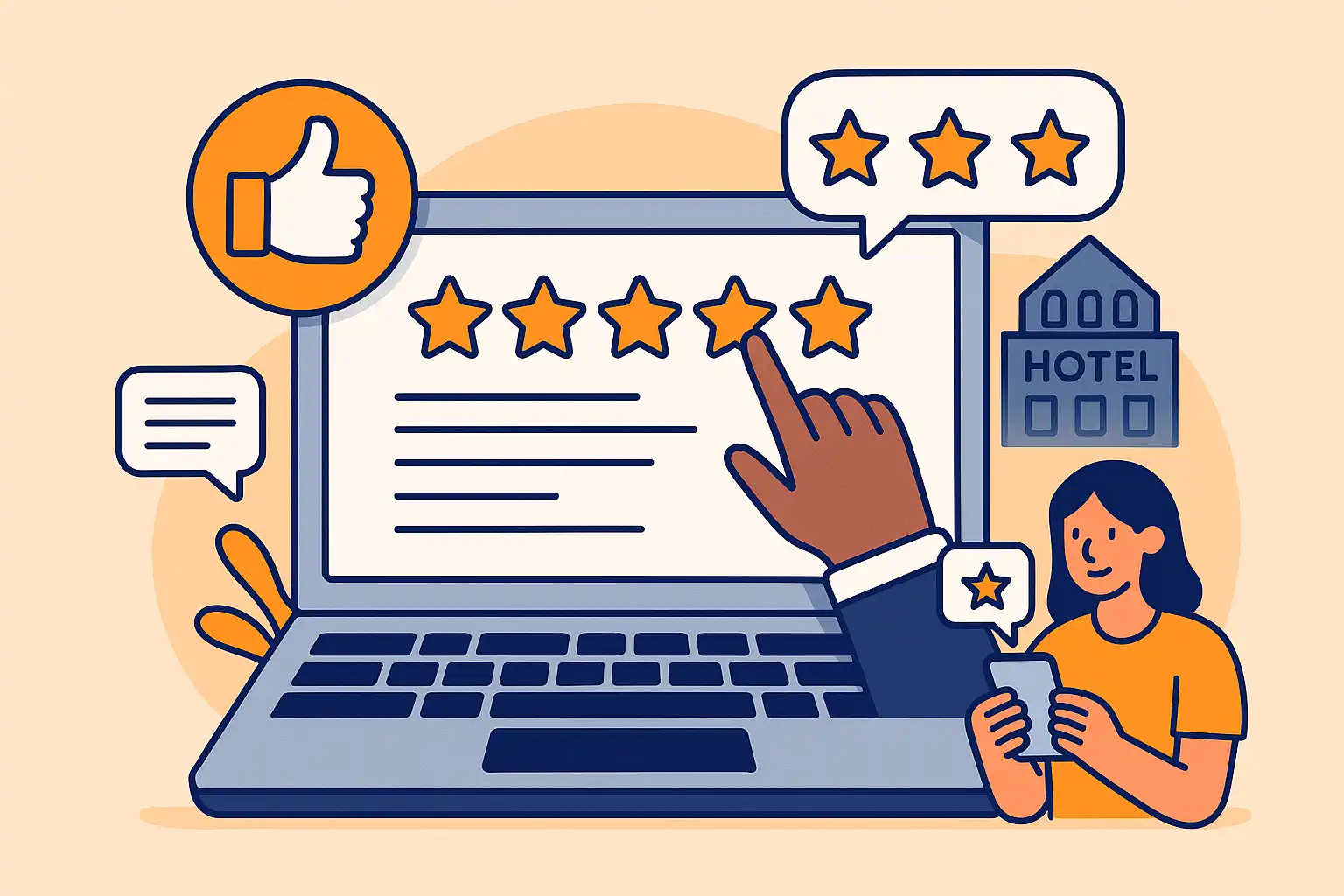How to Improve Hotel Reputation: Guide to Reputation Management
 Mika Takahashi
Mika Takahashi Mika Takahashi
Mika TakahashiIn today’s digital-first world, your hotel’s online reputation is more than just a number—it’s a key factor that can make or break your business. Every review, social media mention, and guest interaction shapes how future visitors see your property, often before they even step through your doors. With so many travelers relying on online feedback when choosing where to stay, mastering hotel reputation management isn’t just smart—it’s essential for long-term success.
The numbers don’t lie. About 72% of travelers check out hotel reviews before booking, and even a single-star boost in your rating can increase your revenue by 5-9%. Yet, surprisingly, less than half of hotels actively manage their hotel online reputation. This gap presents a huge opportunity for hotels ready to get proactive and stand out from the competition.
This guide walks you through everything you need to know to improve your hotel reputation, foster strong guest relationships, and drive more direct bookings—helping you reduce your reliance on costly online travel agencies. From smart review management tactics to cutting-edge technology, you’ll learn how top hotels turn guest feedback into real revenue growth.

The hospitality industry has changed dramatically. Gone are the days when word-of-mouth was just face-to-face chatter—now, it’s a vast digital conversation happening across review sites, social media, and search engines. Your hotel’s online reputation influences whether travelers click “book” or move on.
Studies show that 72% of travelers read reviews before booking, and that includes business travelers and groups, not just vacationers. A strong reputation doesn’t just fill rooms; it lets you charge premium rates and enjoy higher occupancy. This trust also means more direct bookings and less dependence on third-party platforms that eat into your profits.
What’s more, only 42% of hotels actively use reputation management solutions. That means if you take charge of your hotel’s online reputation, you’re already ahead of most competitors. Hotels that do this well see better financial results and happier guests.
But it’s not just about money. A positive hotel reputation builds loyalty, encourages repeat visits, and sparks word-of-mouth marketing. Plus, great reputations attract top-notch staff who want to work where the atmosphere is positive—creating a cycle of excellence that guests notice and appreciate.
Managing online reviews well is the backbone of effective hotel reputation management. Your guests are sharing their experiences all over the internet, so it’s crucial to keep an eye on what’s being said and respond thoughtfully.
Make it a daily habit to check major review sites like Google Business Profile, TripAdvisor, Booking.com, Expedia, and Yelp. Each platform has its quirks, so tailor your responses accordingly for the best impact.
Timing is everything. Aim to reply to every review within 48 hours with personalized, genuine messages. Avoid generic replies—they can come off as cold and damage your reputation instead of helping it.
Set up Google Alerts for your hotel and competitors to catch mentions across the web. This helps you stay on top of conversations and spot trends in guest feedback early.
Encourage your happiest guests to leave positive reviews by sending post-stay emails within 24 hours when their experience is still fresh. You can also place QR codes around your property to make reviewing quick and easy for tech-savvy visitors.
Consider using review aggregation tools that pull feedback from multiple platforms into one central location. These tools simplify managing and responding to reviews and provide valuable analytics to spot guest satisfaction trends. The best hotels see hotel review management as an ongoing dialogue with their guests—not just damage control.
Proactive guest engagement takes hospitality to the next level by anticipating needs and solving problems before they grow into negative feedback. This means connecting with guests at every stage—from before they arrive to after they leave.
Start by sending personalized pre-arrival messages with check-in details, local tips, and answers to common questions. This kind of thoughtful communication eases guest stress and sets a great tone for their stay.
During their visit, check in with guests via SMS or messaging apps to make sure everything’s going smoothly. A simple “How’s your stay going?” can catch small issues before they become big problems.
Empower your staff to fix problems on the spot without waiting for management approval. Quick resolutions show guests you care and boost satisfaction. Keep records of these interactions to identify patterns and improve your operations.
Build detailed guest profiles that note preferences, special occasions, and past feedback. Remembering a guest’s favorite coffee or room temperature can turn a good stay into a memorable one, inspiring positive reviews and repeat visits.
After checkout, send sincere thank-you notes and invite guests to complete surveys. This final touchpoint shows appreciation and gives you a chance to address any lingering concerns privately.

Social media is more than just a marketing channel—it’s a vital part of your hotel’s brand reputation. It lets you show off your property’s personality and build genuine connections with guests and prospects.
Keep your profiles active on Facebook, Instagram, Twitter, and LinkedIn, adapting your content to fit each platform’s style. Use Facebook for community engagement, Instagram for stunning visuals, Twitter for quick updates, and LinkedIn to connect with business travelers.
Share content that highlights your hotel’s amenities, local attractions, and real guest stories. Behind-the-scenes glimpses of your team add a human touch that followers love. Encourage guests to post about their stays using branded hashtags and create Instagram-worthy spots around your property.
Partner with local influencers and travel bloggers who align with your brand to reach new audiences authentically. Authentic collaborations usually perform better than obvious sponsorships.
Use social media analytics to see what content resonates most and refine your strategy over time.
Gathering guest feedback isn’t just about star ratings—it’s about getting a full picture of guest satisfaction and spotting opportunities to improve.
Send post-stay surveys within 24 hours to maximize response rates. Mix rating scales with open-ended questions to get both quantitative data and rich insights.
Offer incentives like loyalty points or discounts to encourage participation. These investments often pay off through better guest satisfaction and actionable feedback.
Use in-room tablets or QR codes for real-time feedback during stays, allowing you to fix issues immediately and potentially avoid negative reviews.
Analyze feedback trends regularly to uncover recurring themes and prioritize improvements. Sentiment analysis tools can help you understand the emotions behind reviews, giving you deeper insights than star ratings alone.
Negative reviews may sting, but they’re also a chance to show how much you value guest satisfaction. How you respond can influence not just the reviewer but also potential guests reading your replies.
Respond quickly with empathy and a genuine acknowledgment of the guest’s experience. Avoid defensive or dismissive language. Instead, show that you’re listening and committed to making things right.
Apologize when it’s appropriate and offer concrete solutions or compensation. Be transparent about what went wrong and the steps you’re taking to prevent it happening again. This builds trust with future guests.
Whenever possible, take detailed discussions offline by providing direct contact info. Many unhappy guests become loyal advocates when they feel truly heard.
Use negative feedback as a learning tool. Share insights with your team and update training and procedures accordingly.
Follow up after resolving issues and kindly ask if guests would consider updating their reviews. Many appreciate the effort and revise their feedback positively.
Your hotel’s online presence isn’t just reviews—it includes your website, search engine visibility, and digital marketing.
Make sure your website is mobile-friendly, fast, and filled with professional photos and virtual tours that highlight your property’s best features. Most travelers browse on their phones, so a smooth mobile experience is a must.
Claim and keep your business profiles up to date on all major platforms with accurate info and eye-catching photos. Consistency here boosts search rankings and builds guest trust.
Use local hotel SEO tactics to improve your visibility for searches in your area. Include relevant keywords and keep your contact info consistent everywhere online.
Showcase glowing guest reviews and testimonials on your website to reassure potential guests. Adding guest photos can make these even more authentic.
Create engaging blog content about local attractions, events, and hotel news to attract visitors and improve SEO.

Great guest experiences start with well-trained, motivated staff who understand their role in building your hotel’s reputation.
Educate every employee on why hotel reputation management matters and how their actions impact guest satisfaction and reviews. When staff see the bigger picture, they take more pride in their work.
Provide customer service training that encourages going beyond the basics to create memorable moments.
Hold regular workshops on handling complaints gracefully. Role-playing tough situations builds confidence and consistency.
Set clear service standards but allow flexibility for personalized guest interactions.
Recognize and reward team members who consistently earn positive guest feedback or resolve issues effectively. Public praise motivates everyone to aim higher.
Happy employees create happy guests. Invest in team-building and recognition programs to foster a supportive workplace culture.
Encourage open communication so staff can share ideas and insights on improving guest experiences.
Offer clear career paths to reduce turnover and keep knowledge in-house.
Empower front-line staff to solve guest problems quickly without waiting for approval. This boosts morale and guest satisfaction.
Modern reputation management relies on smart software that helps you monitor, respond, and improve efficiently.
Look for tools that automate review monitoring across all major platforms, including Google Reviews, TripAdvisor, Booking.com, Expedia, Yelp, and social media.
AI-powered sentiment analysis can spot trends and emotional cues that star ratings miss.
Choose platforms with customizable response templates and approval workflows to maintain quality and personalization.
Robust reporting features help track review scores, response rates, volume, and competitor benchmarks.
Integration with your property management system, CRM, and social media accounts creates smooth workflows and richer guest profiles.
TrustYou provides deep review analysis and guest communication tools with advanced sentiment insights.
Revinate integrates guest data and personalized messaging across the guest journey, perfect for boosting direct bookings.
GuestRevu delivers award-winning review monitoring with strong support, ideal for independent hotels and small chains.
Hotels Quality connects reputation management with quality assurance and staff training tools, linking feedback directly to improvements.
When choosing software, consider integration options, pricing, support quality, and features that match your hotel’s needs. Most vendors offer free trials so you can test before committing.
Even the best hotels face reputation challenges sometimes. Having a solid crisis communication plan helps protect your brand and shows guests you’re responsible and transparent.
Plan for scenarios like data breaches, accidents, or viral negative posts. Quick, coordinated responses minimize damage.
Work with PR experts familiar with hospitality to navigate tough situations calmly and professionally.
Be honest and accountable—avoid excuses or defensiveness. Guests appreciate transparency.
Take immediate corrective actions and communicate them clearly.
Monitor social media and news to respond quickly to misinformation and legitimate concerns.
Document everything to learn and improve your crisis response for the future.
Good reputation management is measurable. Keep an eye on key metrics like average review scores, response rates, and review volume over time.
Compare your rankings on TripAdvisor, Google, and OTA sites against local competitors to see how you stack up.
Analyze sentiment trends and guest satisfaction scores to spot patterns and opportunities.
Share monthly reports with your team to highlight wins and areas for growth.
Connect reputation efforts to business results like direct bookings, occupancy, and revenue to demonstrate ROI.
Use guest data to link specific improvements to higher satisfaction scores, guiding your priorities.
Start with a thorough audit of your current online presence—review scores, response times, and guest feedback themes.
Set up basic monitoring tools like Google Alerts before investing in advanced software.
Create response templates that still allow for personalization to speed up replies.
Train your staff on reputation management and guest engagement best practices.
Implement guest feedback systems at key points in the journey, starting with post-stay surveys.
Choose reputation management software that fits your size and budget, upgrading as your needs grow.
Make reputation management a continuous commitment, not a one-off task. Genuine care for guests and consistent effort build lasting competitive advantages.
By focusing on exceptional service and leveraging smart technology, you can improve hotel reputation, increase direct revenue, and create memorable guest experiences that keep visitors coming back.
Your hotel’s reputation is one of your most valuable assets. Use these strategies to build a positive online presence that attracts more guests, reassures potential guests, and drives your business forward.